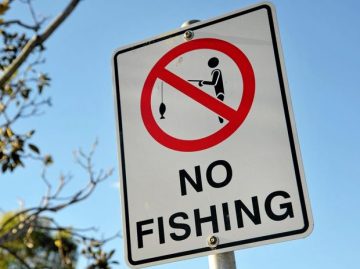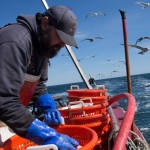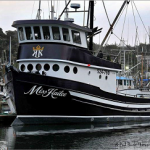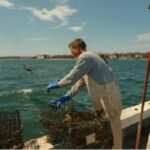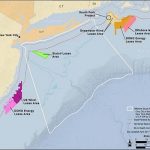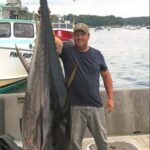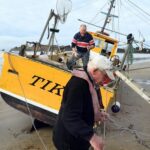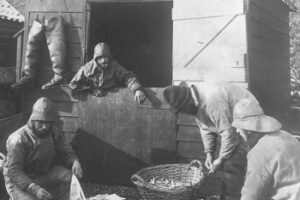Tag Archives: Catch Shares
Controversy brewing over snapper-grouper Exempted Fishing Permit
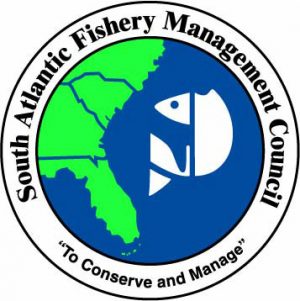 A storm is brewing in the South Atlantic region, a storm of controversy over snapper-grouper fisheries access and allocation. A group of four commercial fishing businesses – the South Atlantic Commercial Fishing Collaborative – filed an Exempted Fishing Permit (EFP) application with the National Marine Fisheries Service on Feb. 6. If approved by NMFS, the EFP would allow a group of 25 snapper-grouper boats operated by the four businesses to harvest blueline tilefish, gag grouper, gray triggerfish, greater amberjack, vermilion snapper and species in the jacks complex for two years (2018-19) in a pilot program while being exempt from numerous fishing regulations. The generic name for such a fisheries management method is catch shares, which, according to NOAA Fisheries, is a program in which “a portion of the catch for a species is allocated to individual fishermen or groups. Each holder of a catch share must stop fishing when his/her specific share of the quota is reached.” But it is a concept the huge majority of saltwater fishermen – recreational fishermen and small commercial fishing operations – have proven to be vehemently opposed to. continue reading the story here 08:12
A storm is brewing in the South Atlantic region, a storm of controversy over snapper-grouper fisheries access and allocation. A group of four commercial fishing businesses – the South Atlantic Commercial Fishing Collaborative – filed an Exempted Fishing Permit (EFP) application with the National Marine Fisheries Service on Feb. 6. If approved by NMFS, the EFP would allow a group of 25 snapper-grouper boats operated by the four businesses to harvest blueline tilefish, gag grouper, gray triggerfish, greater amberjack, vermilion snapper and species in the jacks complex for two years (2018-19) in a pilot program while being exempt from numerous fishing regulations. The generic name for such a fisheries management method is catch shares, which, according to NOAA Fisheries, is a program in which “a portion of the catch for a species is allocated to individual fishermen or groups. Each holder of a catch share must stop fishing when his/her specific share of the quota is reached.” But it is a concept the huge majority of saltwater fishermen – recreational fishermen and small commercial fishing operations – have proven to be vehemently opposed to. continue reading the story here 08:12
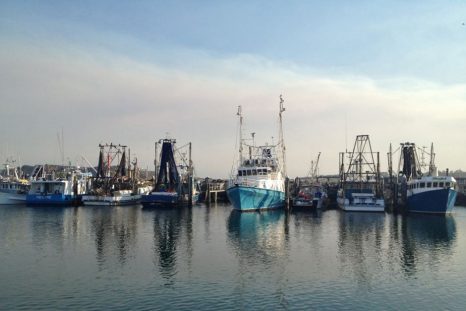
Fishing inquiry calls for more money for adjustment and an urgent assessment of fishing stocks
An inquiry into commercial fishing in New South Wales has recommended the Government find more money to help fishermen adjust to reforms. $16 million dollars has been put aside to help fishermen buy extra shares to stay in the industry, but many have claimed that won’t be enough. Chair of the inquiry Robert Brown said about $20 million might be required. “No fisher, none of these small businesses should be left hanging,” he said. The reforms were aimed at removing a large number of “latent” licences from the industry but Mr Brown said those licences should have been handled differently from active licences held by working fishermen. continue reading the story here 20:21
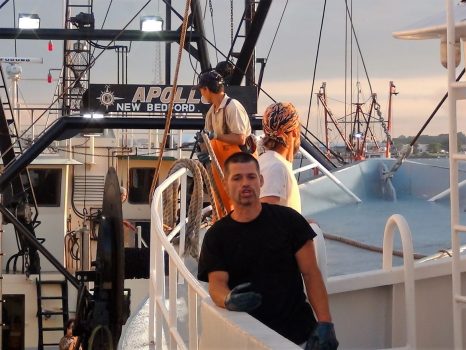
A look back at the evolution of Catch Shares
In 2010 CSF board member Nils Stolpe conducted some exhaustive research into catch shares as a management tool and given what has transpired since it is worth looking over his findings today. Here, for example is a prophetic quote from the NEFMC’S June 2010 Draft Environmental Impact Statement for Amendment 15 to the Council’s Sea Scallop Fishery Management Plan : “…consolidation measures like ITQs, but also more generally leasing and stacking, tend to have their negative impacts on those less powerful segments of the fishing industry, namely the crew, or the small business owners without a fleet of vessels or vertically integrated business. Those who are better able to take advantage of measures like leasing or stacking are then increasingly able to exert control in various markets, such as leasing quota, hiring crew, or even affecting prices that fishermen receive for their product. These kinds of changes, in turn, affect the structure of communities—through changing relations between people and shifts in dominant values—and affect the viability of fishing communities as some are disproportionally impacted by geographic shifts in fishing businesses.” That was about the scallop fleet but the impact is now decimating single boat owners in our New England groundfishery. The complete report (three papers) is included here 14:28
How sustainable seafood can harm coastal communities
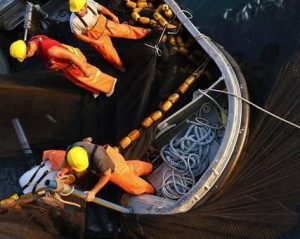 Kai Ryssdal: Tell me the story of how this book came to be. Lee van der Voo: Sure. Actually, I had just written a story about seafood and was in a bar with a bunch of writers loudly complaining about how I was never going to do it again. Somebody heard me and bet me, on the spot, one beer that they could get me to do it. And they started telling me about a new policy push to make seafood more sustainable in America and how it was starting to have some really significant downstream consequences for coastal communities and people who fish. Ryssdal: Long story short, you lost the beer. Van der Voo: Yeah, I lost that bet. It was worth it. Ryssdal: Do me favor and define a term for me, because it’s kind of at the root of this whole book, this idea of “catch share. Audio report, read the rest here 09:08
Kai Ryssdal: Tell me the story of how this book came to be. Lee van der Voo: Sure. Actually, I had just written a story about seafood and was in a bar with a bunch of writers loudly complaining about how I was never going to do it again. Somebody heard me and bet me, on the spot, one beer that they could get me to do it. And they started telling me about a new policy push to make seafood more sustainable in America and how it was starting to have some really significant downstream consequences for coastal communities and people who fish. Ryssdal: Long story short, you lost the beer. Van der Voo: Yeah, I lost that bet. It was worth it. Ryssdal: Do me favor and define a term for me, because it’s kind of at the root of this whole book, this idea of “catch share. Audio report, read the rest here 09:08
HOOKED UP: Red snapper catch share allotment a “retirement plan” for many shareholders
 The most controversial part of the Red Snapper IFQ program may be the part that allows shareholders to sell their yearly allocation. It essentially turns some fishermen into businessmen. Our research has revealed about 120 shareholders – 37 percent of the whole – sell their entire allocation each year. It allows the shareholders to make tens, and in some cases, hundreds of thousands of dollars a year. Galveston commercial fisherman Buddy Guindon defends these fishermen ”It’s his retirement,” he tells us. Slidell commercial fisherman Tommy Williams thinks some of the program needs to be tweaked, but he thinks these shares provide security for retirement fishermen “They worked for the shares,” Williams says. “They were out here, getting their hands cut, cut by fish, bit by fish, baiting hooks. That is their retirement because most fishermen don’t have a 401(k). This is their 401(k).” FOX 8 News sent letters to the fishermen who appeared to be selling their yearly allocations. We heard back from many of them. Read the story here 09:20
The most controversial part of the Red Snapper IFQ program may be the part that allows shareholders to sell their yearly allocation. It essentially turns some fishermen into businessmen. Our research has revealed about 120 shareholders – 37 percent of the whole – sell their entire allocation each year. It allows the shareholders to make tens, and in some cases, hundreds of thousands of dollars a year. Galveston commercial fisherman Buddy Guindon defends these fishermen ”It’s his retirement,” he tells us. Slidell commercial fisherman Tommy Williams thinks some of the program needs to be tweaked, but he thinks these shares provide security for retirement fishermen “They worked for the shares,” Williams says. “They were out here, getting their hands cut, cut by fish, bit by fish, baiting hooks. That is their retirement because most fishermen don’t have a 401(k). This is their 401(k).” FOX 8 News sent letters to the fishermen who appeared to be selling their yearly allocations. We heard back from many of them. Read the story here 09:20
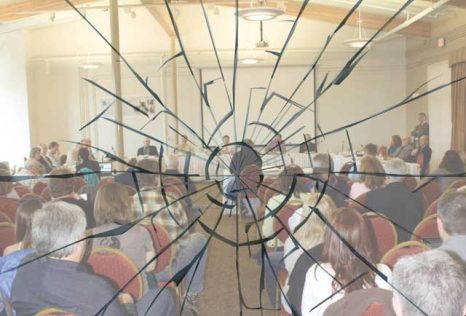
Wow! Council cracks up over catch shares
Everyone in the Gulf of Alaska agrees on one thing: it was the other side’s fault. Depending on who you ask, catch shares are evil incarnate or an angel of good management. Depending on who you ask, they’ll either save Kodiak or kill it. Depending on who you ask, it’s either the State of Alaska’s fault or its credit for not allowing catch shares in the Gulf of Alaska’s groundfish fishery. And depending on who you ask, they’ll either come up again or get sliced up into a handful of other little nibbles at the Gulf of Alaska bycatch problems. Either sighs of relief or defeat leaked from every mouth in the room on this past Dec. 12 when the North Pacific Fishery Management Council, which oversees all federal fisheries from three to 200 miles off the Alaska coast, indefinitely tabled a complex range of options for the Gulf of Alaska groundfish fisheries. Read the story here! 21:17
Catch Shares – ‘I have no fingernails’: Paul’s distress as livelihood slips away
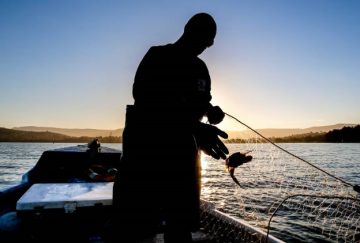 Those are the words of Illawarra commercial fisherman Paul Heron – spoken amid a heartfelt plea against planned NSW government changes that will likely see him without a job. Those reforms – part of the government’s Commercial Fisheries Business Adjustment Program, announced last year – include the introduction of minimum shareholding from July 2017. That means fishers must hold a certain number of shares to be endorsed to fish. “It is basically going to make a small fisher like me, with a young family and a mortgage – I am two years into my mortgage – we are basically going to lose our house,” he told the inquiry. Minister for Primary Industries Niall Blair told the hearing he had listened to fishers up and down the NSW coast. “The change is difficult, the change is hard, but it is necessary to have an industry going into the future,” Mr Blair said. A man in a suit. Video, read the rest here, including Paul Heron’s submission to the Senate inquiry into commercial fishing in NSW. 14:42
Those are the words of Illawarra commercial fisherman Paul Heron – spoken amid a heartfelt plea against planned NSW government changes that will likely see him without a job. Those reforms – part of the government’s Commercial Fisheries Business Adjustment Program, announced last year – include the introduction of minimum shareholding from July 2017. That means fishers must hold a certain number of shares to be endorsed to fish. “It is basically going to make a small fisher like me, with a young family and a mortgage – I am two years into my mortgage – we are basically going to lose our house,” he told the inquiry. Minister for Primary Industries Niall Blair told the hearing he had listened to fishers up and down the NSW coast. “The change is difficult, the change is hard, but it is necessary to have an industry going into the future,” Mr Blair said. A man in a suit. Video, read the rest here, including Paul Heron’s submission to the Senate inquiry into commercial fishing in NSW. 14:42
No Catch Shares! Gulf rationalization dies a quiet death
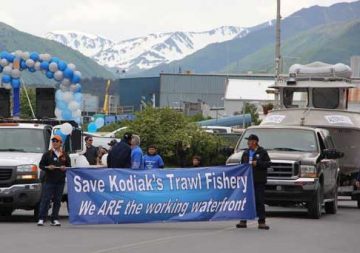 Gulf of Alaska groundfish will remain an open access fishery indefinitely after the North Pacific Fishery Management Council tabled a policy package that has enraged fishermen of all stripes over the last year. Depending on who is asked, the council acted at either its best or its worst with the decision. “The council process didn’t work. They didn’t solve the problem,” said Julie Bonney, executive director of the Groundfish Forum, an industry group of trawlers and processors. “They just took the political part first and ignored the management. I have to keep reminding myself, this isn’t about management. It’s about politics.” Others said the council did exactly what it should have done in the face of so many contentious decisions on which so many people expressed opinions. “I think this is actually the best illustration of council process, rather than the worst,” said Duncan Fields, a Kodiak attorney and former council member who was among the most vocal on this subject. “It shows that one gear group with a particular ideology and particular economic interest with very good advocates can’t just jam something through the council,” he said. “The council allows other participants, small boat fishermen, community, stakeholders to also have a voice, and that voice has said a catch share program is not the best public policy. You don’t always get the result you want.” Read the rest here 20:39
Gulf of Alaska groundfish will remain an open access fishery indefinitely after the North Pacific Fishery Management Council tabled a policy package that has enraged fishermen of all stripes over the last year. Depending on who is asked, the council acted at either its best or its worst with the decision. “The council process didn’t work. They didn’t solve the problem,” said Julie Bonney, executive director of the Groundfish Forum, an industry group of trawlers and processors. “They just took the political part first and ignored the management. I have to keep reminding myself, this isn’t about management. It’s about politics.” Others said the council did exactly what it should have done in the face of so many contentious decisions on which so many people expressed opinions. “I think this is actually the best illustration of council process, rather than the worst,” said Duncan Fields, a Kodiak attorney and former council member who was among the most vocal on this subject. “It shows that one gear group with a particular ideology and particular economic interest with very good advocates can’t just jam something through the council,” he said. “The council allows other participants, small boat fishermen, community, stakeholders to also have a voice, and that voice has said a catch share program is not the best public policy. You don’t always get the result you want.” Read the rest here 20:39
Commercial fishermen fear for future under NSW Government industry (catch share) reforms
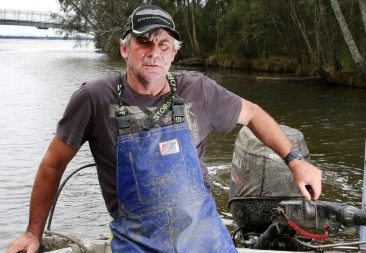 Allan Reed left school at The Entrance at the age of 16, he has overcome many snags in a 37-year career as a commercial fisherman on the Central Coast. But now the 53-year-old and his 79-year-old father, Allan Sr, along with dozens of other commercial fishers in the region, face the “soul-destroying” prospect of it all coming to an abrupt end. Mr Reed and his father will have to pay $370,000 to keep their prawning, mud-crab and meshing business operating in local waters under the State Government’s reforms to the $90 million industry. “We’ll have to buy all these extra shares to keep operating just as we are now. How does that make sense?” In a week when an upper house inquiry into commercial fishing in NSW is hearing submissions from various stakeholders, Mr Reed said the industry overhaul was “all about benefiting a handful of people and driving out the rest of us”. NSW Wild Caught Fishers Coalition president Dane Van Der Neut estimates half of the 100 commercial fishers on the Coast, from Tuggerah Lake to the Hawkesbury, will be “squeezed out” when the reforms kick in from July next year. Read the story here 15:34
Allan Reed left school at The Entrance at the age of 16, he has overcome many snags in a 37-year career as a commercial fisherman on the Central Coast. But now the 53-year-old and his 79-year-old father, Allan Sr, along with dozens of other commercial fishers in the region, face the “soul-destroying” prospect of it all coming to an abrupt end. Mr Reed and his father will have to pay $370,000 to keep their prawning, mud-crab and meshing business operating in local waters under the State Government’s reforms to the $90 million industry. “We’ll have to buy all these extra shares to keep operating just as we are now. How does that make sense?” In a week when an upper house inquiry into commercial fishing in NSW is hearing submissions from various stakeholders, Mr Reed said the industry overhaul was “all about benefiting a handful of people and driving out the rest of us”. NSW Wild Caught Fishers Coalition president Dane Van Der Neut estimates half of the 100 commercial fishers on the Coast, from Tuggerah Lake to the Hawkesbury, will be “squeezed out” when the reforms kick in from July next year. Read the story here 15:34
Catch Shares – Fishing Family Devastated by NSW Government Fishery Reforms
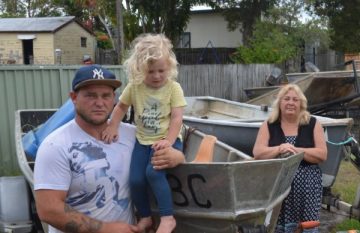 Tears come to Donna Cook’s eyes as she describes the sale of her and her husband’s family fishing business; forced, they say, by the impact of the NSW Government’s fishing reforms. After five generations spanning more than 100 years of working the Macleay, the Cook family sold their Stuarts Point fishing business earlier this year to an investor. “We’ve always been a successful fishing family, we’ve bought a home and raised five kids,” Donna told the Argus. “But we lost 60 per cent of our income from the reforms. “We just couldn’t go on.” The State Government reasons that the reform will ensure economic viability and environmental sustainability for the sector. But Donna said the changes have crippled fishers from around the State, with many forced to sell out to wealthy investors and large scale fishing operations. Catch Shares! Read the story here 09:42
Tears come to Donna Cook’s eyes as she describes the sale of her and her husband’s family fishing business; forced, they say, by the impact of the NSW Government’s fishing reforms. After five generations spanning more than 100 years of working the Macleay, the Cook family sold their Stuarts Point fishing business earlier this year to an investor. “We’ve always been a successful fishing family, we’ve bought a home and raised five kids,” Donna told the Argus. “But we lost 60 per cent of our income from the reforms. “We just couldn’t go on.” The State Government reasons that the reform will ensure economic viability and environmental sustainability for the sector. But Donna said the changes have crippled fishers from around the State, with many forced to sell out to wealthy investors and large scale fishing operations. Catch Shares! Read the story here 09:42
Don’t bite on risky lure of ‘catch shares’
 I can’t think of a more appropriate saying to use than “a wolf in sheep’s clothing” to describe the reality of what the Seafood Harvesters of America want to do with our offshore fisheries. The Post and Courier recently published an article and editorial that bought into the sheep’s clothing side. Year-round fishing and better fisheries data are touted. Who could be against that? But there’s a wolf: privatization of our fisheries through a scheme called “catch shares,” where fishermen and corporations are actually given ownership of our fisheries with shares that can be bought or sold like stock on Wall Street. That’s the real reason for the Seafood Harvesters of America’s existence. They’re working hard to ensure commercial fishermen own our fisheries, and in this case it’s our snapper and grouper, starting with a pilot program that could be considered by the South Atlantic Fishery Management Council and NOAA Fisheries next year. Read the op-ed here 08:02
I can’t think of a more appropriate saying to use than “a wolf in sheep’s clothing” to describe the reality of what the Seafood Harvesters of America want to do with our offshore fisheries. The Post and Courier recently published an article and editorial that bought into the sheep’s clothing side. Year-round fishing and better fisheries data are touted. Who could be against that? But there’s a wolf: privatization of our fisheries through a scheme called “catch shares,” where fishermen and corporations are actually given ownership of our fisheries with shares that can be bought or sold like stock on Wall Street. That’s the real reason for the Seafood Harvesters of America’s existence. They’re working hard to ensure commercial fishermen own our fisheries, and in this case it’s our snapper and grouper, starting with a pilot program that could be considered by the South Atlantic Fishery Management Council and NOAA Fisheries next year. Read the op-ed here 08:02
Catch Shares: NSW fishermen face difficult decisions as deadline looms for reform package
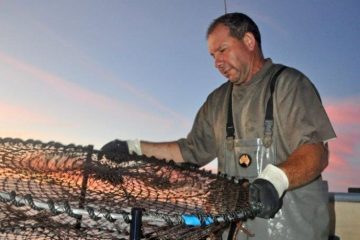 Friday is a big day for New South Wales fishermen. Those that want to leave the industry and take advantage of a government buyback have to decide by that date. Those that want to keep fishing are anxiously waiting to find out if they can buy-up the other’s shares and they are wondering what it will cost them. Peter Ragno fishes out of Wallace Lake near Tuncurry on the Mid North Coast. His family have been fishermen since 1891, catching prawns and mud crabs, mullet, brim and whiting among other species. The government has reduced the quote linked to his shares so just to maintain his business he will need to buy licences worth close to a quarter of a million dollars, money he cannot afford to borrow. Read the rest here 11:54
Friday is a big day for New South Wales fishermen. Those that want to leave the industry and take advantage of a government buyback have to decide by that date. Those that want to keep fishing are anxiously waiting to find out if they can buy-up the other’s shares and they are wondering what it will cost them. Peter Ragno fishes out of Wallace Lake near Tuncurry on the Mid North Coast. His family have been fishermen since 1891, catching prawns and mud crabs, mullet, brim and whiting among other species. The government has reduced the quote linked to his shares so just to maintain his business he will need to buy licences worth close to a quarter of a million dollars, money he cannot afford to borrow. Read the rest here 11:54
How the privatization of our oceans is sinking fishermen
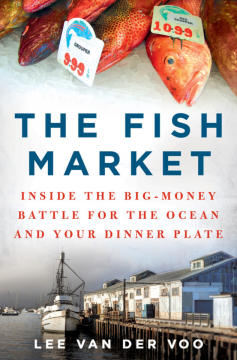 The town of St. George, off the Bering Sea near Alaska, was long home to some of the most robust pollock fishing in the country. But due to a fishing rights management scheme called “catch shares,” the town has no rights to fish its own waters and regularly watches their former industry literally pass them by. “Every year, the industry takes about $2 billion in gains out of this fish resource on the Bering Sea,” St. George Mayor Pat Pletnikoff tells Lee van der Voo in “The Fish Market.” “Not one plug nickel sticks to St. George.” Catch shares work by dividing our oceans just like any other physical property, creating theoretical property lines. Then the rights to fish different species in various sections are awarded to applicants — which could be individuals or companies — based on how much fish they catch over a certain period of time. While catch shares are credited with greater species management — the US government found in 2007 that of 230 species of fish, 92 were going quickly extinct due to overfishing — the catch-shares program has virtually privatized our oceans, destroying the livelihoods of many lifelong fishermen and other small businesses in the process. Read the rest here 08:14
The town of St. George, off the Bering Sea near Alaska, was long home to some of the most robust pollock fishing in the country. But due to a fishing rights management scheme called “catch shares,” the town has no rights to fish its own waters and regularly watches their former industry literally pass them by. “Every year, the industry takes about $2 billion in gains out of this fish resource on the Bering Sea,” St. George Mayor Pat Pletnikoff tells Lee van der Voo in “The Fish Market.” “Not one plug nickel sticks to St. George.” Catch shares work by dividing our oceans just like any other physical property, creating theoretical property lines. Then the rights to fish different species in various sections are awarded to applicants — which could be individuals or companies — based on how much fish they catch over a certain period of time. While catch shares are credited with greater species management — the US government found in 2007 that of 230 species of fish, 92 were going quickly extinct due to overfishing — the catch-shares program has virtually privatized our oceans, destroying the livelihoods of many lifelong fishermen and other small businesses in the process. Read the rest here 08:14
The Race to Spread the EDF IFQ Recreational Fishery Propaganda.
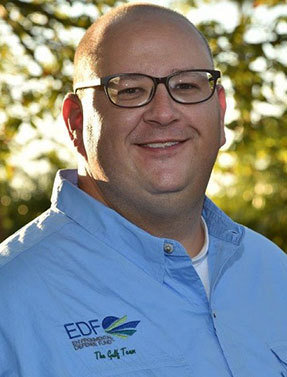 Gulf fisheries were in dire condition before the Environmental Defense Fund teamed with local fishermen across the Gulf, from Florida to Texas, to help turn things around. In those days, fishermen were stuck under failing management that perpetuated overfishing and reduced the population of Gulf red snapper to just 4 percent of its historic level. Due to misguided and ineffective rules, the commercial fleet was in a derby system — a race to catch fish that was dangerous and destructive to both fish and fishermen’s businesses. The catch limits that were put in place to solve the problem were not working. Seeing their livelihoods collapsing under failing management, commercial fishermen voted twice, in supermajorities, to implement a system known as catch shares or individual fishing quotas, which went on the water in 2007. EDF is proud to have worked with our fishing partners on this system. Read the story here 10:22
Gulf fisheries were in dire condition before the Environmental Defense Fund teamed with local fishermen across the Gulf, from Florida to Texas, to help turn things around. In those days, fishermen were stuck under failing management that perpetuated overfishing and reduced the population of Gulf red snapper to just 4 percent of its historic level. Due to misguided and ineffective rules, the commercial fleet was in a derby system — a race to catch fish that was dangerous and destructive to both fish and fishermen’s businesses. The catch limits that were put in place to solve the problem were not working. Seeing their livelihoods collapsing under failing management, commercial fishermen voted twice, in supermajorities, to implement a system known as catch shares or individual fishing quotas, which went on the water in 2007. EDF is proud to have worked with our fishing partners on this system. Read the story here 10:22

Is Environmental Defense Fund Controlling Louisiana’s Department Of Wildlife And Fisheries?
By now our readers are surely familiar with the very strange behavior of Louisiana Department of Wildlife and Fisheries secretary Charlie Melancon with respect to his opposition to a bill brought by most of Louisiana’s congressional delegation that would put individual Gulf states, rather than the federal government, in control of the red snapper fishery in the Gulf of Mexico. If you’re not up to speed on Melancon’s antics and escalating feud with a key member of the delegation, Baton Rouge congressman Garret Graves, we offered a primer here. Most of the speculation you may have seen involves the idea that several of the larger commercial fishing concerns along the Gulf coast, who benefit from a crony-capitalist scheme wherein shares of the red snapper market have been allocated based on incumbency – the owners of those concerns have been given the moniker “Sea Lords” since the red snapper catch largely resembles a feudal system of sorts – have essentially bought Melancon and his opposition to the bill Graves is proposing is a product of that purchase. Graves’ idea to put the state in charge of the red snapper fishery would break up the current allocation scheme and put the Sea Lords out of commission in Louisiana, or at least make their incumbency a matter which would be up for grabs. Read the story here 08:10
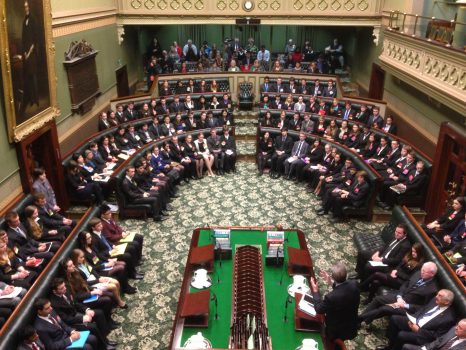
Thirteen year old girl’s heartfelt plea in front of NSW Parliament House to save NSW fishing industry
A thirteen year old girl has fronted a packed room in NSW Parliament House to urge the government to rethink commercial fishing reforms which she said were destroying her family’s livelihood. Maddison Blanch spoke before a meeting of fishing professionals, industry leaders and politicians on Wednesday, although no one from the Liberal or National parties attended. She told the crowd her third-generation fisher father, Phillip Blanch, had been hit hard by a scheme forcing him to buy back his right to work. “My father, like the majority of fishers in NSW, goes to work rain, hail or shine,” she said. “My dad goes to work and provides Australia with fresh Aussie seafood and brings an income home for his family just like every other Aussie dad. “My dad loves what he does but, because of reforms, my dad needs to buy more shares to continue to work as he does now, for 2017. “So basically he needs to buy back his job, like most fishers.” Ms Blanch said her father could not buy shares because no one was selling them, and he should not have to take out a loan to be able to afford to do his own job. Read the story here 09:01
Catch Shares: Commercial fishers on Far South Coast want action on restructure
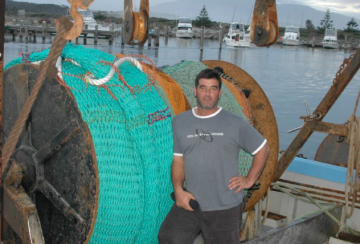 The restructure of the NSW commercial fishing industry is reaching an important milestone with companies and individuals having until tomorrow to decide on whether they take a $20,000 buy-out to exit the industry. NSW Labor called on the State Primary Industries Minister to suspend the restructure process until more information is on the table to assist fishers in making the right decision for themselves, their families, and for the sustainability of the industry in general. But Bermagui Fishermen’s Cooperative managing director Rocky Lagana was of the opposite view and said the three-year restructure process needed to reach a conclusion to afford those who wanted to remain some certainty. Shadow Minister for Primary Industries Mick Veitch however called it policy-on-the-run and said a hastily cobbled together Ministerial press release the day after Labor’s call for a suspension made a few concessions without addressing the real concerns – which are the need for more information, more time and the need to hit the pause button. Read the story here 10:26
The restructure of the NSW commercial fishing industry is reaching an important milestone with companies and individuals having until tomorrow to decide on whether they take a $20,000 buy-out to exit the industry. NSW Labor called on the State Primary Industries Minister to suspend the restructure process until more information is on the table to assist fishers in making the right decision for themselves, their families, and for the sustainability of the industry in general. But Bermagui Fishermen’s Cooperative managing director Rocky Lagana was of the opposite view and said the three-year restructure process needed to reach a conclusion to afford those who wanted to remain some certainty. Shadow Minister for Primary Industries Mick Veitch however called it policy-on-the-run and said a hastily cobbled together Ministerial press release the day after Labor’s call for a suspension made a few concessions without addressing the real concerns – which are the need for more information, more time and the need to hit the pause button. Read the story here 10:26
The NSW Musical Chair Catch Share game – Clarence River fishers have rejected it unanimously
 Clarence River fishers have rejected the latest State Government attempt to restructure their industry. After mulling over Department of Primary Industry restructure information packages sent out a few weeks ago, a meeting including 50 fishers voted unanimously to reject the proposals. The vote occurred at an information/update meeting on the NSW Commercial Fisheries Business Adjustment Program (BAP) for Clarence River and Region 2 Commercial Fishermen on Tuesday at the Harwood Hall. The fishermen, Clarence River Fishermen’s Cooperative directors and management, the Professional Fishermen’s Association and the Wild Caught Fishers Association met to put the contents of the DPI information packages under the microscope. Read the story here 16:55 Watch this video.
Clarence River fishers have rejected the latest State Government attempt to restructure their industry. After mulling over Department of Primary Industry restructure information packages sent out a few weeks ago, a meeting including 50 fishers voted unanimously to reject the proposals. The vote occurred at an information/update meeting on the NSW Commercial Fisheries Business Adjustment Program (BAP) for Clarence River and Region 2 Commercial Fishermen on Tuesday at the Harwood Hall. The fishermen, Clarence River Fishermen’s Cooperative directors and management, the Professional Fishermen’s Association and the Wild Caught Fishers Association met to put the contents of the DPI information packages under the microscope. Read the story here 16:55 Watch this video.
Catch Shares: After 10-year crab review, NPFMC seeks social impact information. Are they blind?
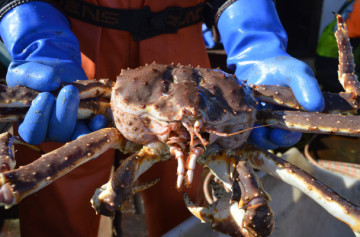 The North Pacific Fishery Management Council approved a 10-year review of rationalization on June 10, the program that ended derby-style crab fisheries in 2005 and gave quota shares to vessel owners, captains and processors. The aim was to reduce overcapitalization and create a safer fishery by allowing crew to fish slower with a guaranteed quota allocation compared to the previous free-for-all. The study – The 10-year review charted a continuation of trends found in the five-year review. Vessel consolidation continued along with quota consolidation, but both somewhat stabilized in the last five years. Fewer people hold quota than before. Each individual quota holder, naturally, holds more quota now than in 2004; 53 fewer people hold Bristol Bay red king crab crew shares now than in 2005. In the two years following rationalization, the crab fleet shrank from 256 vessels in 2004 to 91 in 2006. Read the rest here 12:49
The North Pacific Fishery Management Council approved a 10-year review of rationalization on June 10, the program that ended derby-style crab fisheries in 2005 and gave quota shares to vessel owners, captains and processors. The aim was to reduce overcapitalization and create a safer fishery by allowing crew to fish slower with a guaranteed quota allocation compared to the previous free-for-all. The study – The 10-year review charted a continuation of trends found in the five-year review. Vessel consolidation continued along with quota consolidation, but both somewhat stabilized in the last five years. Fewer people hold quota than before. Each individual quota holder, naturally, holds more quota now than in 2004; 53 fewer people hold Bristol Bay red king crab crew shares now than in 2005. In the two years following rationalization, the crab fleet shrank from 256 vessels in 2004 to 91 in 2006. Read the rest here 12:49
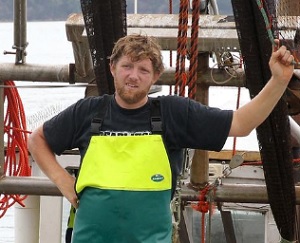
Catch Shares New South Wales Style – Half the Small Boat Fishermen will disappear
MORE than half of the Coast’s 100 commercial fishers are expected to be cut adrift after the state government released its industry reforms last week. Dane Van Der Neut, president of the NSW Wild Caught Fishers Coalition, said the worst fears of local commercial fishers were realised in the Baird Government’s bid to overhaul the $90 million industry. “We’ll now lose over half our fleet, from Tuggerah Lake to the Hawkesbury, because the government wants to corporatise the industry, make all shares equal, and price out the smaller operators,” Patonga-based Mr Van Der Neut said. Terrigal state Liberal MP Adam Crouch hailed the changes as a “new era” for commercial fishing. Read the rest here 08:16
Groundswell – Opposing Catch Share Embezzlements for the Gulf of Alaska
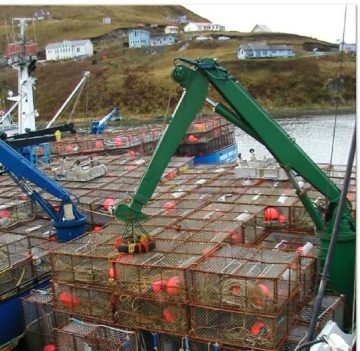 Gulf of Alaska groundfish trawl bycatch amendments for analysis top this week’s North Pacific Fishery Management Council meeting in Kodiak. First up is the 10-year review of the Crab privatization quota system. It put roughly 1,350 fishermen out of work and shifted roughly $800 million of labor’s surplus to some sealords — embezzled from captains and crew. Into today’s capital flight torrent enters 40 groundfish trawlers, also wanting a mixed economy of brutish capitalism combined with another socialistic program of government giveaways. That’s Alternative 2 in the analysis outline, an IFQ proposal. It will result in more capital fleeing Alaska, robbing our communities of the labor surplus that drives rounds of respending that stimulate coastal economies. Greed and lazy are common economic bedfellows. They’ll embezzle 70% off the top, too. IFQs are euphemistically called “catch shares,” while those who do fish get less of a share than before. Since they saw trawl IFQs as inevitable politically, a splinter group of weak feeling local fishermen came up with a nonsensical idea to at least get one piece of the giveaway trawl pie, in something misnamed a Community Fishing Association. Read the op-ed here 20:51
Gulf of Alaska groundfish trawl bycatch amendments for analysis top this week’s North Pacific Fishery Management Council meeting in Kodiak. First up is the 10-year review of the Crab privatization quota system. It put roughly 1,350 fishermen out of work and shifted roughly $800 million of labor’s surplus to some sealords — embezzled from captains and crew. Into today’s capital flight torrent enters 40 groundfish trawlers, also wanting a mixed economy of brutish capitalism combined with another socialistic program of government giveaways. That’s Alternative 2 in the analysis outline, an IFQ proposal. It will result in more capital fleeing Alaska, robbing our communities of the labor surplus that drives rounds of respending that stimulate coastal economies. Greed and lazy are common economic bedfellows. They’ll embezzle 70% off the top, too. IFQs are euphemistically called “catch shares,” while those who do fish get less of a share than before. Since they saw trawl IFQs as inevitable politically, a splinter group of weak feeling local fishermen came up with a nonsensical idea to at least get one piece of the giveaway trawl pie, in something misnamed a Community Fishing Association. Read the op-ed here 20:51






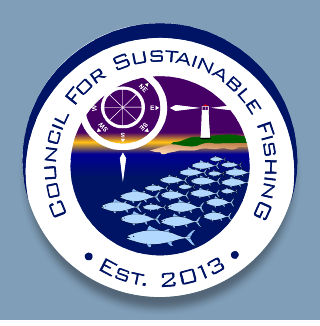
 About a year ago AL.com did an investigative report on the Gulf of Mexico commercial red snapper catch share program in which it called the top share holders ‘sea lords’ and those fishermen who had to pay them for the right to catch red snapper ‘serfs.’ Last week, WVUE-TV in New Orleans did a series of investigative reports on this same catch share program, one of which was entitled “’Snapper barons’ raking in riches from public resource.” These reports highlight what catch shares are all about — creating economic winners and losers, not fishery sustainability, with most fishermen and fishing communities on the losing end. A 2013 report by the Center for Investigative Reporting provides estimates that as many as 18,000 fishing jobs were lost and 3,700 vessels were no longer fishing in areas that had catch share programs.
About a year ago AL.com did an investigative report on the Gulf of Mexico commercial red snapper catch share program in which it called the top share holders ‘sea lords’ and those fishermen who had to pay them for the right to catch red snapper ‘serfs.’ Last week, WVUE-TV in New Orleans did a series of investigative reports on this same catch share program, one of which was entitled “’Snapper barons’ raking in riches from public resource.” These reports highlight what catch shares are all about — creating economic winners and losers, not fishery sustainability, with most fishermen and fishing communities on the losing end. A 2013 report by the Center for Investigative Reporting provides estimates that as many as 18,000 fishing jobs were lost and 3,700 vessels were no longer fishing in areas that had catch share programs. 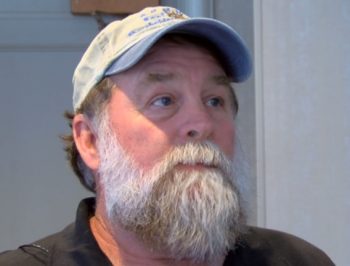

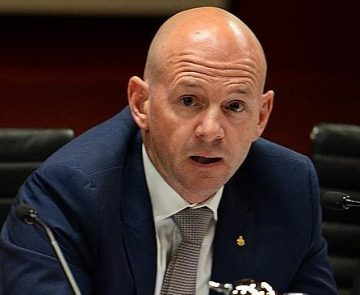
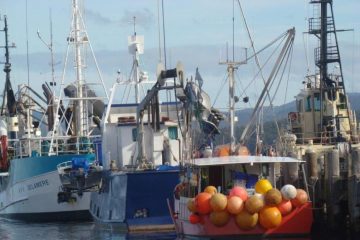 Fishermen in New South Wales are reported to be panic buying shares at massively increased prices to ensure they can continue working next year. That is despite a state government trading scheme starting in early 2017 designed to ensure an orderly transition to a share-based fishery, backed by $16 million in compensation to ease the cost to fishermen. Ticia Limon from Narooma on the state’s south coast said share prices in the Line West fishery had risen more than 300 per cent in the last few months. She bought them to ensure she and her husband could meet new minimum share holding requirements set by the government to continue fishing. NSW Minister for Primary Industry, Niall Blair, has ruled out stopping the reform process in the commercial fishing industry. Key fishing groups including the Professional Fishermen’s Association, the Wild Caught Fishers Coalition and most of the cooperatives have opposed the reforms.
Fishermen in New South Wales are reported to be panic buying shares at massively increased prices to ensure they can continue working next year. That is despite a state government trading scheme starting in early 2017 designed to ensure an orderly transition to a share-based fishery, backed by $16 million in compensation to ease the cost to fishermen. Ticia Limon from Narooma on the state’s south coast said share prices in the Line West fishery had risen more than 300 per cent in the last few months. She bought them to ensure she and her husband could meet new minimum share holding requirements set by the government to continue fishing. NSW Minister for Primary Industry, Niall Blair, has ruled out stopping the reform process in the commercial fishing industry. Key fishing groups including the Professional Fishermen’s Association, the Wild Caught Fishers Coalition and most of the cooperatives have opposed the reforms.  Attempts to prepare fishers for the share trading program of the NSW fishing industry restructure are a shambles says a local industry representative. Clarence River Fishermen’s Cooperative general manager Danielle Adams, attended a mock or pre-trading share program session in Maclean on Tuesday, where she said it was obvious the NSW Department of Primary Industries was clueless about the direction it was taking the industry. “Most attendees including myself left the session disappointed, angrier, dismayed, some distraught, and with many more questions than when we came,” Ms Adams said. The sessions were part of border-to-border training for fishers to prepare them for the opening of share trading. “The trainer was not from DPI/Fisheries, an obvious ploy to avoid having to answer pertinent questions,” she said. She said the inclusion of mental health line numbers in the DPI’s literature showed the department was aware of impacts it could have. “On seeking further clarification individuals were told to call Beyond Blue or a mental health line,” she said. “Imagine calling the DPI line to gain clarification on your financial future and being told they don’t have the answers but being given a mental health number to call instead – they are aware of the toll this process is taking.
Attempts to prepare fishers for the share trading program of the NSW fishing industry restructure are a shambles says a local industry representative. Clarence River Fishermen’s Cooperative general manager Danielle Adams, attended a mock or pre-trading share program session in Maclean on Tuesday, where she said it was obvious the NSW Department of Primary Industries was clueless about the direction it was taking the industry. “Most attendees including myself left the session disappointed, angrier, dismayed, some distraught, and with many more questions than when we came,” Ms Adams said. The sessions were part of border-to-border training for fishers to prepare them for the opening of share trading. “The trainer was not from DPI/Fisheries, an obvious ploy to avoid having to answer pertinent questions,” she said. She said the inclusion of mental health line numbers in the DPI’s literature showed the department was aware of impacts it could have. “On seeking further clarification individuals were told to call Beyond Blue or a mental health line,” she said. “Imagine calling the DPI line to gain clarification on your financial future and being told they don’t have the answers but being given a mental health number to call instead – they are aware of the toll this process is taking. 